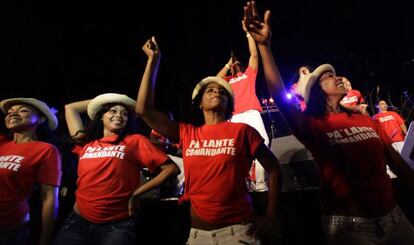Shots fired at Venezuelan opposition
Several injured during stump Incident was staged, say Chávez supporters

A shooting during an opposition candidate's campaign stump in a poor Caracas neighborhood on Sunday has set off international concern that threats of political violence and intimidation will mar Venezuela's presidential race.
Supporters of Henrique Capriles Radonski blamed the supporters of President Hugo Chávez for firing at several of his followers, who were injured in the attack. But the government insists that the Capriles camp fired the shots.
Chávez, who is in Cuba for cancer treatment, has vowed that his illness won't prevent him from running for reelection in October.
The Capriles campaign said that they saw members of Chávez's "red-shirts" - the official uniform of members of the ruling United Venezuelan Socialist Party (PSUV) - open fire when the opposition leader and his supporters were walking through the impoverished Cotiza neighborhood on Sunday. "While the government debates with weapons, we debate with ideas. What are they afraid of?" asked an angry Capriles on Monday.
Vice President Elías Jaua charged that Capriles was conducting an illegal campaign because he was conducting swings before the official campaign period had begun.
Meanwhile, Diosdado Cabello, the PSUV vice president, warned that if there is any challenge to a Chávez victory on October 7, "the revolutionary people will hunker down in the streets with rifles and bayonets in hand to defend the revolution."
"We are not threatening anyone, just offering a warning," Cabello added.
Both sides played footage of the incident, taken from different angles, to accuse each other of firing the shots. It is difficult to determine who opened fire from the footage, however, given that all that can be seen is people running while the crack of gunshots rings out.
After filing a complaint with prosecutors, councilor Andrea Tavares, a Capriles supporter, said Tuesday that she and her family were threatened. "Whatever happens to my family and friends may be linked to these threats that I have received, because I filed a complaint denouncing that the people who attacked the activity in Cotiza were from the PSUV," she told reporters.
Interior Minister Tareck El Aissami has promised a full investigation, but claimed that the attack was "generated" by the opposition "to put on a show." He also charged that the Miranda police, operating outside their state without permission, had attacked government supporters at another rally. Capriles, who is governor of Miranda, denied the accusation.
The opposition television channel Globovisión, which claimed that its journalists were also attacked during Sunday's incident, said in a statement that "it was an armed and organized group that fired weapons against people."
"These were not common criminals; these groups wore red shirts that identified them with a political tendency," the network said in a statement.
The attack also ignited concerns among press groups. "This kind of censorship through the barrel of a gun does not bode well for journalists seeking to report on the crucial upcoming presidential campaign," said Robert Mahoney, deputy director for the Committee to Protect Journalists.
Meanwhile, Chávez said that he will have to undergo more radiation therapy after doctors removed "cancerous" tissue near his pelvic area over the weekend in Havana. But he insists that the cancer has not spread. Last year the Venezuelan leader had two tumors removed.
Having claimed that he was cured last year some Venezuelans are doubting news of his prognosis, and even believe that he may be dying.
Despite the illness, support for Chávez has been strong. Some polls give him a 20-percent lead over Capriles.
Tu suscripción se está usando en otro dispositivo
¿Quieres añadir otro usuario a tu suscripción?
Si continúas leyendo en este dispositivo, no se podrá leer en el otro.
FlechaTu suscripción se está usando en otro dispositivo y solo puedes acceder a EL PAÍS desde un dispositivo a la vez.
Si quieres compartir tu cuenta, cambia tu suscripción a la modalidad Premium, así podrás añadir otro usuario. Cada uno accederá con su propia cuenta de email, lo que os permitirá personalizar vuestra experiencia en EL PAÍS.
¿Tienes una suscripción de empresa? Accede aquí para contratar más cuentas.
En el caso de no saber quién está usando tu cuenta, te recomendamos cambiar tu contraseña aquí.
Si decides continuar compartiendo tu cuenta, este mensaje se mostrará en tu dispositivo y en el de la otra persona que está usando tu cuenta de forma indefinida, afectando a tu experiencia de lectura. Puedes consultar aquí los términos y condiciones de la suscripción digital.








































